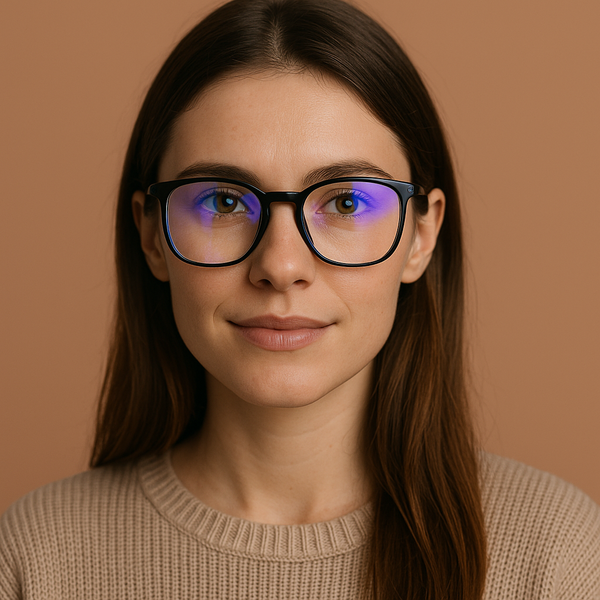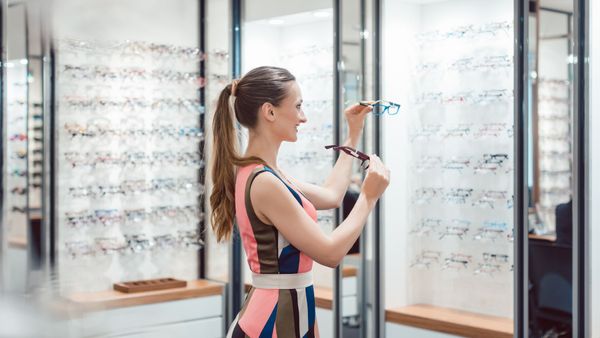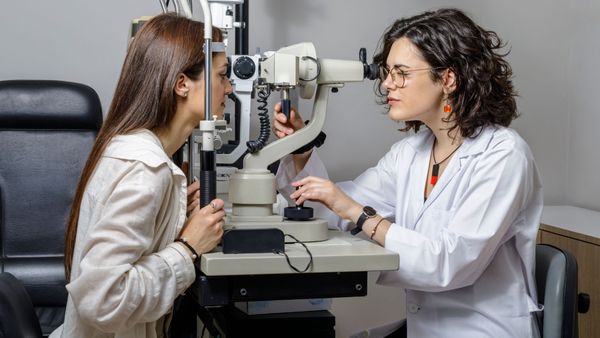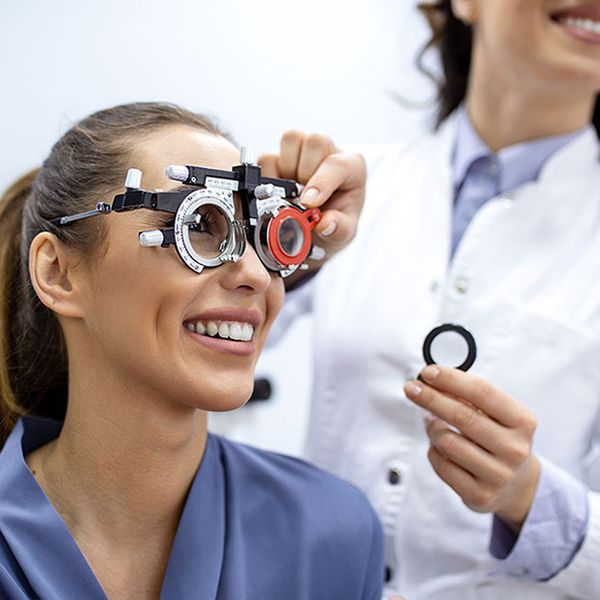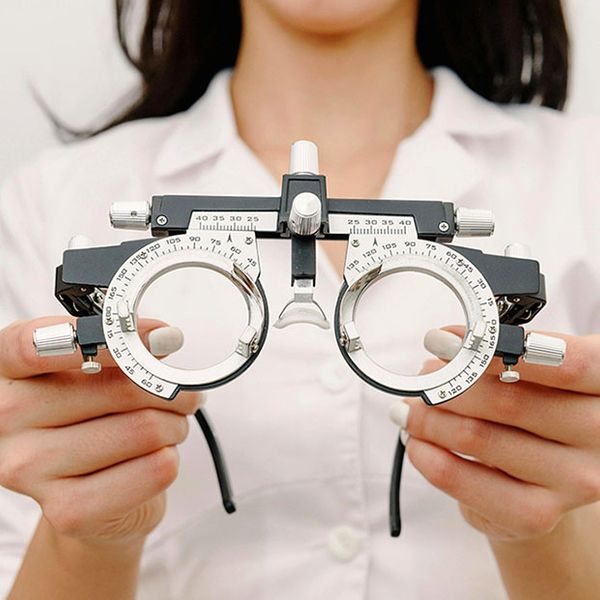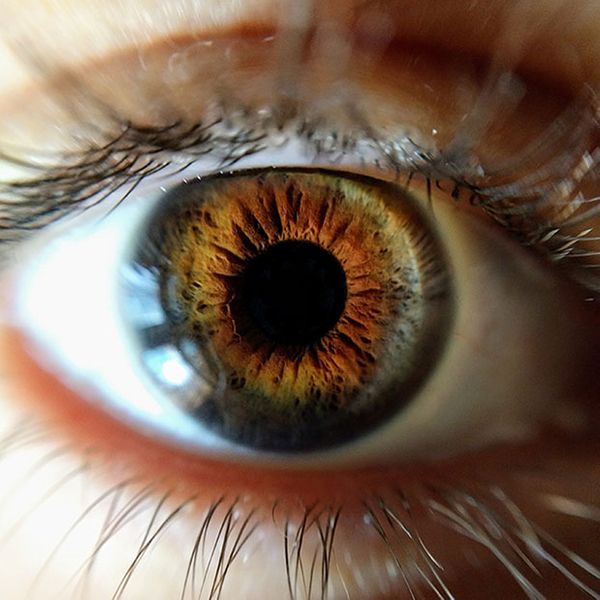Blog
Recent Updates
Blue Light and Your Eyes: What You Really Need to Know
Infocus Eye Care
You’ve probably heard the buzz about blue light…
If your eyes feel tired after a long day on your phone or computer, you’re not alone. Many patients ask us whether blue light from digital screens is harming their eyes — or if those blue-light glasses everyone’s talking about actually work. Let’s separate fact from fiction and go over what the science really says.
What Exactly Is Blue Light?
Blue light is a type of visible light on the color spectrum — right next to ultraviolet (UV) light. It has a short wavelength (around 400–500 nanometers). It’s found naturally in sunlight and artificially in LED lights, TVs, phones, and computer screens. It helps regulate your sleep cycle (circadian rhythm) and can even boost alertness during the day.
So, blue light isn’t “bad.” The concern is how much and when we’re exposed to it — especially in our modern, screen-filled lives.
Does Blue Light Damage the Eyes?
Short answer: Not at the levels from your devices. According to both the American Optometric Association (AOA) and the American Academy of Ophthalmology (AAO), current research shows no proven link between blue light from screens and permanent retinal damage.
moreUnderstanding Different Lens Types: A Guide to Eyeglasses
Navigating the world of eyeglass lenses can be overwhelming, especially with the variety of options available. At Infocus Eye Care, we believe the right lenses not only enhance your vision but also complement your lifestyle and personal style. This guide will explore different types of lens materials, helping you choose the best option for your eyeglasses.
moreHow Regular Eye Exams Can Help Prevent Eye Infections
Regular eye exams are essential for maintaining overall eye health and preventing infections. As your trusted Colorado Springs eye doctor, at Infocus Eye Care we emphasize the importance of comprehensive vision exams to detect potential issues early and keep your eyes healthy.
moreWhat Sets Infocus Eye Care Apart From Other Colorado Eye Care Centers?
At Infocus Eye Care, we understand that choosing the right eye care provider is essential for maintaining optimal vision and health. So, what sets us apart from other Colorado eye care centers? As a trusted Colorado Springs eye doctor, we pride ourselves on utilizing advanced technology and a thorough understanding of eye health, ensuring you receive the best care possible. Schedule your comprehensive vision exam today!
moreStaying Ahead of Our Aging Eyesight
Aging brings many changes, and our eyesight is no exception.
As we grow older, our vision can transform in various ways, from minor alterations to more serious conditions that could impact our quality of life. Recognizing these changes early is key to managing and mitigating potential issues effectively. Regular eye exams become increasingly important as we age, not only to address common adjustments but also to tackle more significant challenges that may arise.
moreHow Often Should I See an Eye Doctor?
Eye exams are a crucial part of maintaining our overall health.
Regular eye exams are essential, even if you don’t think you need a new glasses or contact lens prescription. Our eyes are complex organs, and a lot can go wrong without noticeable symptoms. Regular check-ups are the best way to detect both minor issues and sight-threatening conditions early.
morePreventing Sports Eye Injuries
Most eye injuries are entirely preventable.
This includes those sustained during athletic activities. While eye protection is commonly associated with professions like welding, construction, or laboratory work, it’s equally crucial for athletes. In the United States alone, proper eye protection could prevent approximately 27,000 of the 30,000 eye injuries reported annually in sports — that’s a staggering 90%. Let’s explore how simple measures can safeguard your eyesight on the field, court, or track.
moreThe Fascinating World of Animal Eyesight
When it comes to vision, nature is both diverse and innovative.
Animals have evolved an array of visual abilities that often far surpass human capabilities, tailored to their unique environments and survival needs. This blog post explores some of the most intriguing differences between human eyesight and that of various animals, shedding light on nature’s ingenuity.
moreEating for Healthy Eyesight
Have you ever wondered why carrots are credited with improving night vision?
This belief actually stems from a clever piece of British wartime propaganda during World War II. To conceal their new radar technology, which was used to spot enemy aircraft at night, the British claimed that their pilots’ exceptional night vision was due to a high-carrot diet. This ruse was so effective that it has persisted as a common misconception to this day. While carrots alone won’t grant you superhero-like vision, there are indeed several foods that genuinely benefit eye health.
moreNew to Glasses? Here’s What to Expect.
Embarking on your glasses journey?
You’ll soon notice some subtle and surprising shifts in your everyday life — quirks and nuances you’d never anticipate. Ready to see how many you’ve already experienced?
moreWhat Healthy Living Does for Your Eyes
Maintaining an active lifestyle not only boosts overall health but also benefits our eyes.
A balanced diet, adequate sleep, and regular exercise contribute to staying fit, feeling vibrant, and building strength. Additionally, these habits lower the risk of chronic conditions such as high blood pressure, type 2 diabetes, and heart diseases. But you might wonder, how are these factors connected to eye health?
moreEye Care Tips for Summer Water Fun
Summer is here, and for many of us, that means heading to the water to cool off and have fun.
Whether you’re planning to splash around in a pool, float down a river, paddle across a lake, ride the waves at the ocean, enjoy the thrills of a water park, or slide through your backyard on a Slip N Slide, it’s important to consider the safety of your eyes. Before you dive into your next aquatic adventure, take a moment to learn about protecting your vision during water activities. Here’s what you need to know to keep your eyes healthy and clear all season long.
moreHow Well Do Your Glasses Flatter Your Face?
When choosing your next pair of glasses, what factors influence your decision?
Consider adding your face shape to that list. Glasses are not just functional; they serve as a customizable element of your facial expression and are a distinctly visible part of your look. They provide a brilliant opportunity to flaunt your unique personality and style preferences. Ideally, they should not only reflect your character but also complement your facial features beautifully.
moreSunglasses Are Critical Eye Protection
Summer is coming, bringing with it extended daylight hours and abundant sunshine!
With the arrival of the warmer months, many of us find ourselves spending more time outdoors. This increased exposure to sunlight also increases our exposure to harmful UV radiation. It’s crucial to protect our eyes by donning UV-blocking sunglasses — not only during the summer but throughout the year whenever we’re outside on sunny days.
moreDifferences in Men’s and Women’s Vision
It might surprise you how different eyesight and eye health can be between the sexes.
For instance, men are at a higher risk of sustaining serious eye injuries, while women are generally more susceptible to various eye diseases. Given these distinctions, what steps can both men and women take to manage their unique eye health needs?
moreHow Vulnerable Are Our Eyes to Germs?
When we rub our eyes, we might be jeopardizing our eye health.
Rubbing our eyes is often an automatic response during moments of fatigue, discomfort from a foreign object, or sensations of dryness and itchiness. While it might seem like a quick fix, this action can actually escalate the issue. This is because with each touch, we transfer bacteria from our hands — along with anything else they’ve come into contact with since we last cleaned them — directly into one of the most delicate areas of our body.
moreBlinking: An Important Part of Eye Health
Why do we need to blink so often?
If you take a moment to tally your blinks over a minute without altering your natural rhythm, you’ll likely find that an adult blinks between ten to twenty times each minute, with each blink lasting only about a tenth of a second.
moreWhen Headaches and Eye Problems Are Linked
Frequent headaches can stem from unexpected sources, including vision problems.
If you find yourself grappling with recurrent headaches, we recommend scheduling an eye examination to investigate potential vision-related factors. While headaches can arise from diverse origins and not all are linked to vision problems, the substantial overlap between the two underscores the importance of exploring this possibility to alleviate discomfort and enhance overall well-being.
moreA Typical Eye Exam
About one in five adults in the United States has an undiagnosed eye condition.
This underscores the critical importance of regular eye exams for maintaining optimal vision health. For those who have never undergone an eye exam, it’s natural to feel uncertain about the process. However, we’re here to demystify the experience and emphasize why it’s crucial for lifelong vision well-being.
moreBeing Colorblind Can Mean Different Things
Color blindness isn’t all black and white.
Despite common misconceptions, color blindness doesn’t equate to seeing the world like a black and white movie. In fact, most individuals with color blindness can perceive some colors, albeit with varying degrees of vividness. Let’s delve into the three primary categories of color blindness and their implications for daily life.
moreStopping AMD in Its Tracks
Age-related macular degeneration (AMD) is a leading cause of permanent vision loss for people over fifty.
The slow loss of central vision occurs due to the deterioration of the macula, the part of the retina with the highest concentration of photoreceptor cells and the part that gives us our detailed central vision. Beyond a certain point, AMD can make it difficult or impossible to perform close-up tasks like reading or writing. It would also be incredibly unsafe to drive.
moreBasic Tips for Keeping Your Eyes Healthy
A crucial yet oft-overlooked component of a high-quality life is healthy eyesight.
Approximately one in six adults grapple with sight-threatening eye conditions, while a significant number experience some degree of vision loss as they age. Aging is a risk factor for prevalent causes of blindness, such as glaucoma, diabetic retinopathy, macular degeneration, and cataracts. However, there are proactive steps we can take to minimize the likelihood of developing these conditions and safeguard our eye health.
moreA Guide to Safer Night Driving
As winter rolls in, the days get shorter, making night driving harder to avoid.
For those of us without perfect eyesight, this annual adjustment can be stressful and potentially dangerous if we neglect the specific challenges posed by driving in the dark. Fortunately, a few simple precautions can significantly impact our safety on the road, benefiting both ourselves and fellow travelers.
moreHow Autoimmune Diseases Impact Eyesight
Autoimmune diseases are conditions in which the immune system turns on healthy cells.
Some of these diseases can have a serious and negative impact on the health and function of the eyes. For those grappling with autoimmune conditions, it’s crucial to be aware of the potential effects on vision. Let’s delve into some of the more prevalent autoimmune diseases and their implications for eye health.
more
